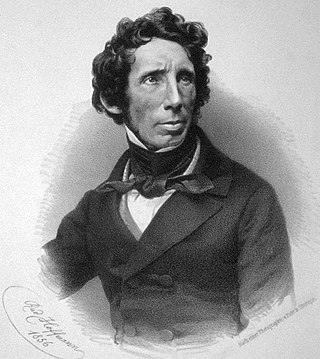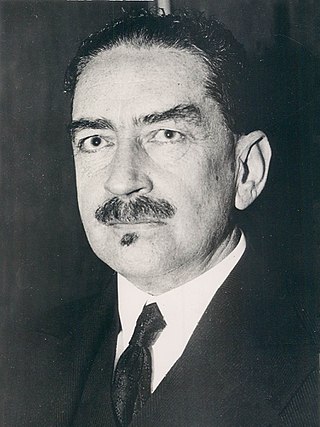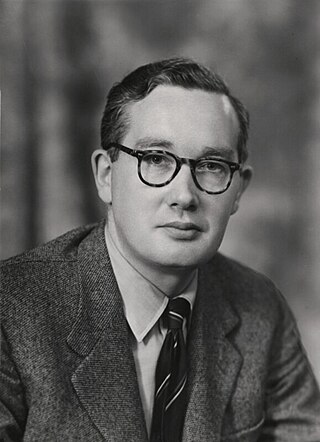Related Research Articles

Friedrich Wöhler FRS(For) HonFRSE was a German chemist known for his work in both organic and inorganic chemistry, being the first to isolate the chemical elements beryllium and yttrium in pure metallic form. He was the first to prepare several inorganic compounds, including silane and silicon nitride.

Fritz Haber was a German chemist who received the Nobel Prize in Chemistry in 1918 for his invention of the Haber–Bosch process, a method used in industry to synthesize ammonia from nitrogen gas and hydrogen gas. This invention is important for the large-scale synthesis of fertilizers and explosives. It is estimated that a third of annual global food production uses ammonia from the Haber–Bosch process, and that this supports nearly half the world's population. For this work, Haber has been called one of the most important scientists and industrial chemists in human history. Haber also, along with Max Born, proposed the Born–Haber cycle as a method for evaluating the lattice energy of an ionic solid.

Vladimir Prelog was a Croatian-Swiss organic chemist who received the 1975 Nobel Prize in chemistry for his research into the stereochemistry of organic molecules and reactions. Prelog was born and grew up in Sarajevo. He lived and worked in Prague, Zagreb and Zürich during his lifetime.
Donald James Cram was an American chemist who shared the 1987 Nobel Prize in Chemistry with Jean-Marie Lehn and Charles J. Pedersen "for their development and use of molecules with structure-specific interactions of high selectivity." They were the founders of the field of host–guest chemistry.

Leibniz University Hannover, also known as the University of Hannover, is a public research university located in Hanover, Germany. Founded on 2 May 1831 as Higher Vocational School, the university has undergone six periods of renaming, its most recent in 2006.

Karl Waldemar Ziegler was a German chemist who won the Nobel Prize in Chemistry in 1963, with Giulio Natta, for work on polymers. The Nobel Committee recognized his "excellent work on organometallic compounds [which]...led to new polymerization reactions and ... paved the way for new and highly useful industrial processes". He is also known for his work involving free-radicals, many-membered rings, and organometallic compounds, as well as the development of Ziegler–Natta catalyst. One of many awards Ziegler received was the Werner von Siemens Ring in 1960 jointly with Otto Bayer and Walter Reppe, for expanding the scientific knowledge of and the technical development of new synthetic materials.

Hans Karl August Simon Euler-Chelpin, since 28 July 1884 von Euler-Chelpin, was a German-born Swedish biochemist. He won the Nobel Prize in Chemistry in 1929 with Arthur Harden for their investigations on the fermentation of sugar and enzymes. He was a professor of general and organic chemistry at Stockholm University (1906–1941) and the director of its Institute for organic-chemical research (1938–1948). Euler-Chelpin was distantly related to Leonhard Euler. He married chemist Astrid Cleve, the daughter of the Uppsala chemist Per Teodor Cleve. In 1970, their son Ulf von Euler, was awarded the Nobel Prize in Physiology or Medicine.

August Wilhelm von Hofmann was a German chemist who made considerable contributions to organic chemistry. His research on aniline helped lay the basis of the aniline-dye industry, and his research on coal tar laid the groundwork for his student Charles Mansfield's practical methods for extracting benzene and toluene and converting them into nitro compounds and amines. Hofmann's discoveries include formaldehyde, hydrazobenzene, the isonitriles, and allyl alcohol. He prepared three ethylamines and tetraethylammonium compounds and established their structural relationship to ammonia.

Sir Derek Harold Richard Barton was an English organic chemist and Nobel Prize laureate for 1969.

The Gottfried Wilhelm Leibniz Prize, or Leibniz Prize, is awarded by the German Research Foundation to "exceptional scientists and academics for their outstanding achievements in the field of research". Since 1986, up to ten prizes have been awarded annually to individuals or research groups working at a research institution in Germany or at a German research institution abroad. It is considered the most important research award in Germany.
Carl Shipp "Speed" Marvel was an American chemist who specialized in polymer chemistry. He made important contributions to U.S. synthetic rubber program during World War II, and later worked at developing polybenzimidazoles, temperature-resistant polymers that are used in the aerospace industry, in fire-fighting equipment, and as a replacement for asbestos. He has been described as "one of the world's outstanding organic chemists" and received numerous awards, including the 1956 Priestley Medal and the 1986 National Medal of Science, presented by President Ronald Reagan.

Peter John Stang is an American chemist and Distinguished Professor of chemistry at the University of Utah. He was the editor-in-chief of the Journal of the American Chemical Society from 2002 to 2020.
Ralph Franz Hirschmann was a German American chemist who led a team that was responsible for the first organic synthesis of an enzyme, a ribonuclease.
Wolfgang Wienand is a German manager and former world-class fencer. He competed in the individual and team foil events at the 1996 and 2000 Summer Olympics. Since 2019 he serves as Chief Executive Officer and President of Siegfried AG, a Swiss-based global chemical-pharmaceutical company.
Frank Klaus Glorius is a German chemist and W3-Professor of organic chemistry in the Department of Chemistry and Pharmacy at the University of Münster.

Hans-Ulrich Reissig is a German chemist and was a full professor of Organic Chemistry at FU Berlin.
Stephen L. Buchwald is an American chemist and the Camille Dreyfus Professor of Chemistry at MIT. He is known for his involvement in the development of the Buchwald-Hartwig amination and the discovery of the dialkylbiaryl phosphine ligand family for promoting this reaction and related transformations. He was elected as a fellow of the American Academy of Arts and Sciences and as a member of the National Academy of Sciences in 2000 and 2008, respectively.
Uday Maitra is an Indian organic chemist and a professor in the department of organic chemistry at the Indian Institute of Science. He is known for his studies on molecular tools and supramolecular assemblies. He is a recipient of the Shanti Swarup Bhatnagar Prize for Science and Technology, one of the highest Indian science awards.

Karl Arnold, variously Carl Johann Moritz Arnold or Johann Karl Moritz Arnold, was a German chemist and mountaineer. He served as Director and briefly as Vice-Chancellor of the Institute of Chemistry at the University of Veterinary Medicine Hanover. His published works on organic chemistry were of importance to veterinarians, medical students and pharmacists. He was also an accomplished alpinist and chairman of the Hanover section of the German-Austrian Alpine Association.

Siegfried Huneck was a German chemist and lichenologist. Much of his scientific career was hampered by the political situation in the former German Democratic Republic. He rejected pursuing a career in academia, and instead ended up working at the Leibniz Institute of Plant Biochemistry, a public research institute, from 1969 until his retirement in 1993. Despite his relative isolation and restricted freedoms in East Germany, Huneck had numerous professional contacts both in Germany and abroad, and was a highly published scholar. Many of his more than 400 scientific publications dealt with the chemistry of lichen products. He was awarded the Acharius Medal for lifetime achievements in lichenology in 1996.
References
- 1 2 Schuster, Matthias; Blechert, Siegfried (1997). "Die Olefinmetathese in der organischen Synthese". Angewandte Chemie. 109 (19): 2124. Bibcode:1997AngCh.109.2124S. doi:10.1002/ange.19971091904.
- ↑ "CV Siegfried Blechert".